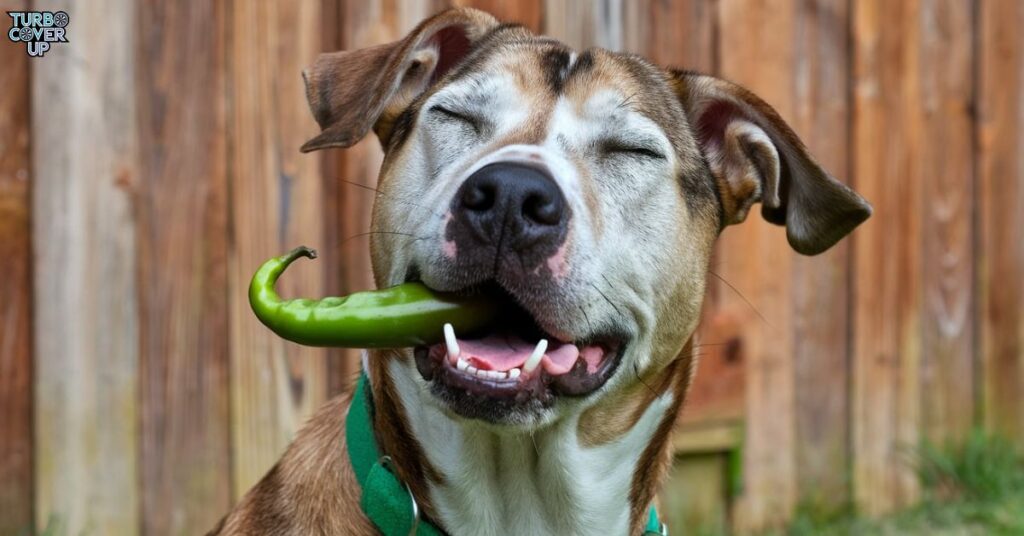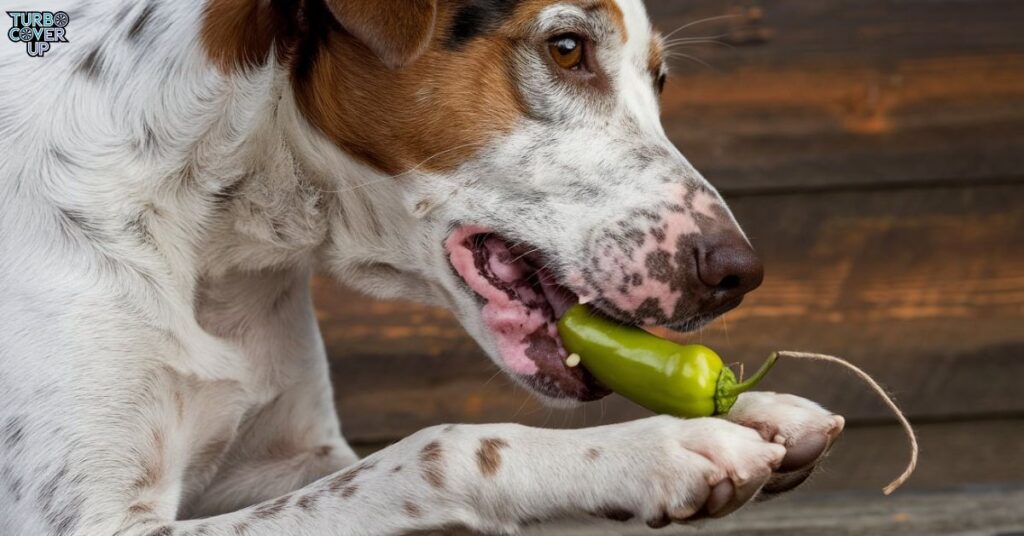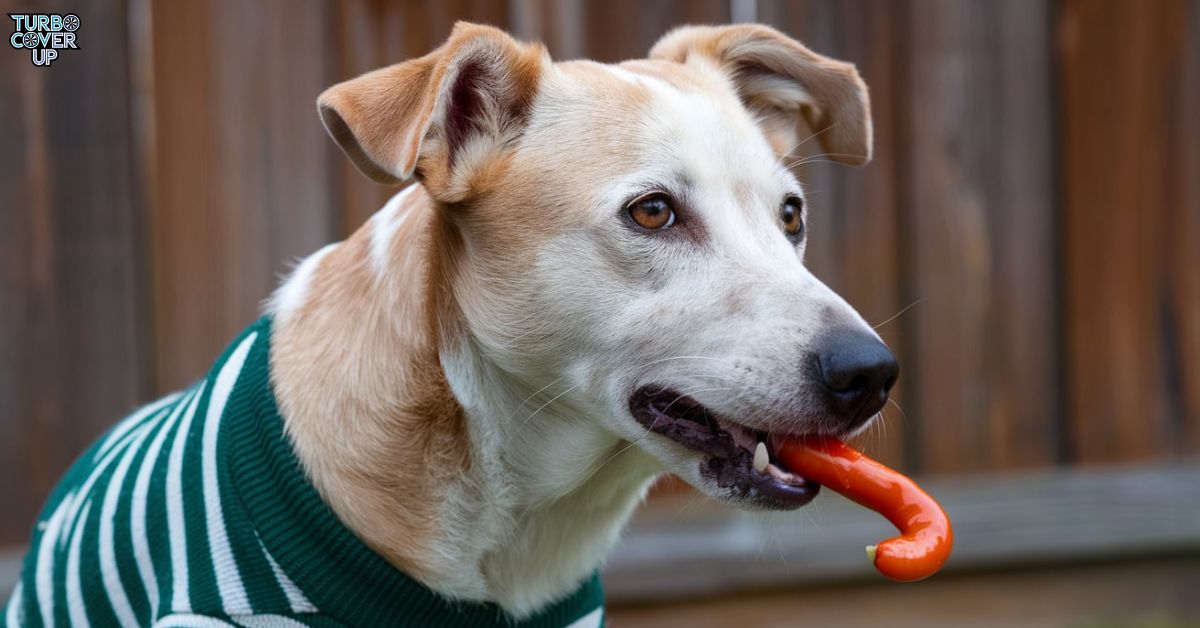Pepperoncini are mild, tangy peppers commonly used in Italian and Greek dishes. These peppers add flavor to salads, pizzas, and sandwiches, making them a popular choice among food lovers. But if you’re wondering, “can dogs eat pepperoncini?” the answer isn’t straightforward and deserves careful consideration.
These peppers are often pickled and high in sodium, which can pose health risks to our furry friends. It’s essential to understand the potential effects of pepperoncini on dogs before sharing this treat with them.
In this article, we will discuss the safety of feeding pepperoncini to dogs and discuss the possible health risks associated with these peppers.
Why Pepperoncini Might Be Okay in Moderation?
Pepperoncini can be safe for dogs in small amounts. These peppers are not very spicy compared to other types. They contain some vitamins and antioxidants that might be good for your dog. A few slices as a treat can add variety to their diet. Always remove any seeds, as they can make the pepper spicier.
Feeding your dog too much pepperoncini can cause problems. Large amounts can upset their stomach and lead to vomiting or diarrhea. Moderation is key. Keep an eye on your dog after giving them any new food. If they show signs of discomfort, contact your veterinarian. Remember, dogs do not need spicy foods. Focus on providing balanced meals that meet their nutritional needs for better health
When to Avoid Pepperoncini for Your Dog
It’s best to avoid giving pepperoncini to your dog in the following situations

Your dog has a sensitive stomach
Dogs with a sensitive stomach need special care. These dogs may react poorly to certain foods, including pepperoncini. Even small amounts can upset their stomach. Symptoms may include vomiting, diarrhea, or excessive drooling.
If your dog shows these signs after eating new foods, stop giving them those treats. Always be cautious with spicy or tangy foods.
You should choose safe and gentle snacks for dogs with sensitive stomachs. Plain boiled chicken or rice works well. Vegetables like carrots and green beans are good options too. Always introduce new foods slowly.
This way, you can see how your dog reacts. If any issues arise, consult your vet. They can help you find the best diet for your furry friend. Keeping your dog healthy and comfortable is the top priority.
Your dog is a puppy
Puppies have special needs. They grow quickly and need the right food. Their stomachs are sensitive. Giving them spicy foods, like pepperoncini, can upset their tummies. Puppies may not know what is good for them. It’s the owner’s job to keep them safe.
Young dogs need a balanced diet. This diet should include protein and healthy grains. Giving them too many new foods can cause problems. It’s best to stick to puppy food. Always consult a vet before adding new treats.
If a puppy eats pepperoncini, it can lead to discomfort. Signs include vomiting or diarrhea. Keeping puppies healthy is very important. Make sure to choose safe snacks that support their growth. Pepperoncini is not suitable for young dogs. It is best to avoid it altogether.
Your dog has any underlying health conditions
Dogs with underlying health conditions need special care. These dogs might have issues like diabetes or heart problems. Their diet plays a big role in their health. Giving them spicy foods, such as pepperoncini, can cause more harm.
Even small amounts might upset their stomachs. Symptoms can include vomiting and diarrhea. Always check with a vet before offering new foods.
Health conditions can make dogs sensitive to certain ingredients. Foods that are safe for healthy dogs might not be safe for them. It is important to follow a strict diet. A balanced diet helps manage their health problems.
Treats should be limited and safe. Pepperoncini is not a good option for dogs with health issues. Avoid giving them spicy or high-sodium foods. Keeping your dog healthy means choosing safe snacks. Regular vet visits are essential for monitoring their health.
Potential Risks of Pepperoncini for Dogs

Pepperoncini can pose several potential risks for dogs. These peppers contain capsaicin, which can irritate a dog’s stomach. Consuming them may lead to symptoms like drooling, vomiting, or diarrhea. Dogs are more sensitive to capsaicin than humans, so even a small amount might upset their digestive system.
Digestive Upset
Digestive upset can happen when a dog eats something that doesn’t agree with them. This can include foods like pepperoncini. Symptoms may show up quickly. They can include vomiting, diarrhea, and stomach pain. A dog might also drool more than usual or refuse to eat.
If a dog has digestive upset, it is important to watch them closely. Offering them bland food like rice and boiled chicken can help. Keeping their water bowl full is also a good idea. If symptoms last longer than a day, a vet visit is needed. Quick action can help your dog feel better soon.
Choking Hazard
Pepperoncini can be a choking hazard for dogs. Their shape and size can make it hard for a dog to chew properly. If a dog bites off a big piece, it might get stuck in their throat. This can cause coughing, gagging, or even panic.
In some cases, choking can be very serious. A dog may struggle to breathe if food blocks their airway. If a dog shows signs of choking, stay calm and act quickly. Trying to remove the obstruction gently is important. If it doesn’t work, getting help from a vet is needed. Always supervise your dog when they eat new foods.
Individual Sensitivity
Individual sensitivity can vary among dogs. Some dogs may handle new foods better than others. A dog might enjoy a treat, while another could get an upset stomach. This difference often depends on their unique health and digestive system.
When introducing any new food, caution is key. It’s wise to start with a tiny piece of pepperoncini. This small amount helps to check for any reactions. Signs of sensitivity may include vomiting or diarrhea. If these symptoms happen, stop giving that food. Consulting a veterinarian is a good step for any concerns.
Sodium Content
Pepperoncini often comes pickled in brine. This brine has a lot of sodium. High sodium content can be harmful to dogs. It may lead to increased thirst and urination. In severe cases, it can cause sodium ion poisoning. Symptoms of this poisoning include vomiting, diarrhea, and tremors.
Sodium is not a needed part of a dog’s diet. Too much salt can disrupt their health. Dogs are more sensitive to sodium than humans. It is important to avoid foods that are high in salt. Always choose fresh, low-sodium options for your dog. Keeping your dog’s diet balanced helps maintain their health and happiness.
Seeds and Stems
Seeds and stems from pepperoncini can be harmful to dogs. The seeds might increase the spiciness of the pepper. This extra heat can upset a dog’s stomach. Eating seeds could also cause choking. Stems can be tough for dogs to chew and digest.
Both seeds and stems are not safe snacks. They do not provide any nutritional benefits. It is best to keep these parts away from dogs. When serving pepperoncini, only give the flesh of the pepper. Always remove any seeds and stems. This helps keep your dog safe and happy.
When Is Pepperoncini Okay For Dogs To Eat?
Pepperoncini can be okay for dogs in small amounts. They are not very spicy, like some other peppers. A little piece can be a fun treat. However, only give this pepper if your dog shows interest. Always check for any seeds or stems first.
It is important to watch your dog after eating pepperoncini. If your dog has an upset stomach, stop giving them this food. Serving pepperoncini should be rare. A dog’s diet should mostly consist of safe foods. Always consult your vet before sharing new snacks. This keeps your dog healthy and happy.
What To Give Your Dog Instead of Pepperoni
Instead of pepperoni, many tasty and safe options exist for dogs. Lean meats like chicken or turkey are great choices.
Lean Proteins
- Chicken (cooked, boneless, skinless)
- Turkey (cooked, boneless, skinless)
- Salmon (cooked, boneless)
Vegetables
- Carrots (raw or cooked)
- Green beans (raw or cooked)
- Sweet potatoes (cooked)
- Pumpkin (cooked, plain)
- Peas (cooked)
Fruits
- Apples (sliced, seeds and core removed)
- Blueberries
- Strawberries
- Bananas (in moderation)
- Watermelon (seedless, rind removed)
- Mango (peeled, pit removed)
Whole Grains
- Plain cooked rice
- Quinoa
Human Foods That Are OK for Dogs
Many human foods are safe for dogs. Lean proteins like chicken, turkey, and salmon are great choices. These can provide essential nutrients. Always cook these meats without seasoning or bones.
Vegetables and fruits can also be good for dogs. Carrots, green beans, and sweet potatoes are healthy snacks. Fruits like apples, blueberries, and bananas are safe in small amounts.
Whole grains like plain rice and quinoa can be added to their diet. Always check for any allergies before giving new foods. These options can help keep your dog healthy and happy.
Conclusion
Dogs should not eat pepperoncini. While these peppers are not toxic, they can cause discomfort and health issues for dogs. The capsaicin in pepperoncini may lead to digestive upset, and the high sodium content can be harmful.
If your dog accidentally eats a small piece, watch for any signs of distress. Always choose dog-friendly snacks like lean meats, fruits, and vegetables instead. Keeping your dog safe and healthy is essential, so avoid sharing spicy or pickled foods with them.
Frequently Asked Questions
Is pepperoncini okay for dogs?
No, pepperoncini is not safe for dogs. The capsaicin in peppers can cause digestive upset and discomfort.
What peppers can dogs not eat?
Dogs should avoid spicy peppers like jalapeños and chili peppers. These can lead to stomach irritation and serious health issues.
What should I do if my dog eats pepperoncini?
If your dog eats pepperoncini, watch for symptoms like vomiting or diarrhea. If symptoms occur, contact your veterinarian for advice.
Can dogs eat any type of pepper?
Dogs can eat bell peppers in moderation, as they are safe and nutritious. Avoid feeding them spicy or pickled varieties.
What are safe human foods for dogs?
Safe human foods for dogs include lean meats, certain fruits, and vegetables. Always introduce new foods gradually and in small amounts.
>>>Read more:

